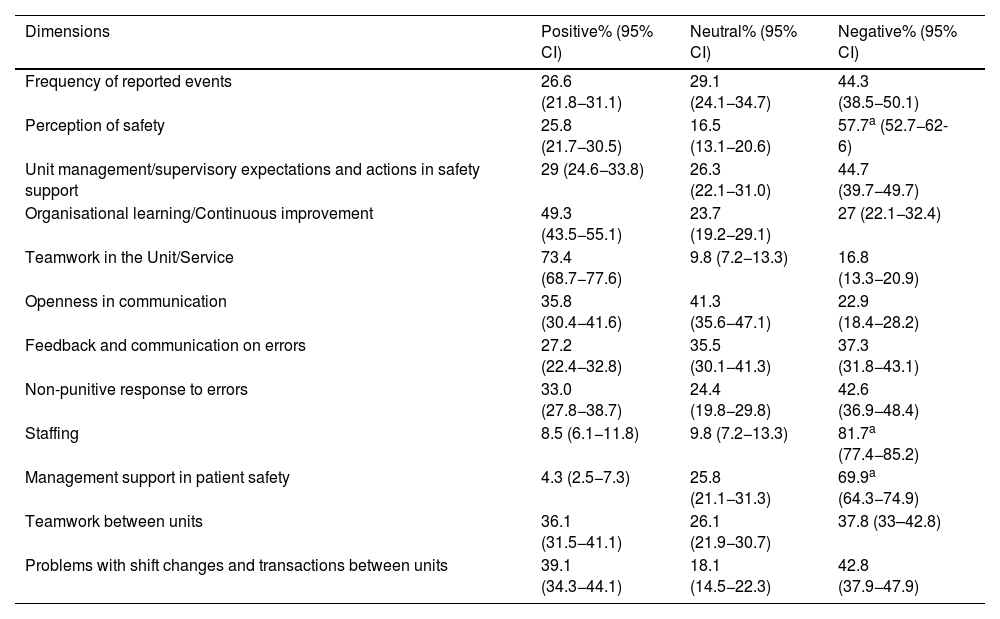Critical care Area (CCA) is one of the most complex in the hospital system, requiring a high number of interventions and handling of amounts of information. Therefore, these areas are likely to experience more incidents that compromise patient safety (PS).
AimTo determine the perception of the healthcare team in a critical care area about the patient safety culture.
MethodCross-sectional descriptive study, September 2021, in a polyvalent CCA with 45 beds, 118 health workers (physicians, nurses, auxiliary nursing care technicians). Sociodemographic variables, knowledge of the person in charge in PS and their general training in PS and incident notification system were collected. The validated Hospital Survey on Patient Safety Culture questionnaire, measuring 12 dimensions was used.
Positive responses with an average score ≥75%, were defined as an area of strength while ≥50% negative responses were defined as an area of weakness.
Descriptive statistics and bivariate analysis: X2 and t-Student tests, and ANOVA. Significance p ≤ 0.05.
Results94 questionnaires were collected (79.7% sample). The PS score was 7.1 (1.2) range 1−10. The rotational staff scored the PS with 6.9 (1.2) compared to 7.8 (0.9) for non-rotational staff (p = 0.04). A 54.3% (n = 51) was familiar with the incident reporting procedure, 53% (n = 27) of which had not reported any in the last year. No dimension was defined as strength. There were three dimensions that behaved like a weakness: security perception: 57.7% (95% CI: 52.7−62.6), staffing: 81.7% (95% CI: 77.4−85.2) and management support: 69 .9% (95% CI: 64.3−74.9).
ConclusionsThe assessment of PS in the CCA is moderately high, although the rotational staff has a lower appreciation. Half of the staff do not know the procedure for reporting an incident. The notification rate is low. The weaknesses detected are perception of security, staffing and management support. The analysis of the patient safety culture can be useful to implement improvement measures.
El área de críticos (AC) es una de las más complejas dentro del sistema hospitalario, se requiere un elevado número de intervenciones e información, por tanto, son susceptibles de padecer más incidentes que comprometan la seguridad del paciente.
ObjetivoDeterminar la percepción de la cultura de seguridad del paciente del equipo asistencial en un área de críticos.
MétodoEstudio descriptivo transversal, septiembre 2021, en un AC polivalente con 45 camas, 118 sanitarios (médicos, enfermeras, técnicos en cuidados auxiliares de enfermería). Se recogieron variables sociodemográficas, conocimiento del responsable en seguridad del paciente (SP), formación en SP y en el sistema de notificación de incidentes. Se utilizó el cuestionario validado Hospital Survey on Patient Safety Culture que evalúa 12 dimensiones. Se consideró una dimensión como fortaleza con ≥75% respuestas positivas y debilidad con ≥50% respuestas negativas. Estadística descriptiva y análisis bivariante: prueba de X2 y t-Student, y ANOVA. Significación estadística p ≤ 0,05.
ResultadosSe recogieron 94 cuestionarios (79,7% muestra). La valoración del grado de SP fue 7,1 (1,2) sobre 10. El personal polivalente la puntuó con 6,9 (1,2) frente al 7,8 (0,9) del personal sin rotación (p = 0,04). El 54,3% (n = 51) conocía el procedimiento para notificar un incidente, de los cuales el 53% (n = 27) no notificó ninguno en el último año. Ninguna dimensión alcanzó grado de fortaleza. Fueron detectadas como debilidad: percepción de seguridad: 57,7% (IC95%:52,7-62,6), dotación de personal: 81,7% (IC95%:77,4-85,2) y apoyo de gerencia: 69,9% (IC95%:64,3-74,9).
ConclusionesLa valoración del grado de SP en el AC es moderadamente alta, aunque el personal polivalente tiene una apreciación inferior. La mitad del personal no conoce cómo notificar un incidente. La tasa de notificación es baja. Las debilidades detectadas son percepción de seguridad, dotación de personal y apoyo de gerencia. El análisis de la cultura de seguridad puede ser útil para implementar medidas de mejora.
Artículo
Diríjase al área de socios de la web de la SEEIUC, (https://seeiuc.org/mi-cuenta/iniciar-sesion/) y autentifíquese.
Comprando el artículo el PDF del mismo podrá ser descargado
Precio 19,34 €
Comprar ahora









